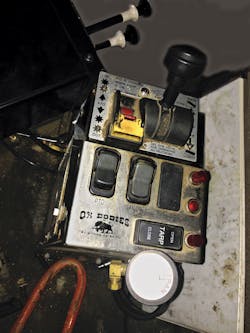Many on-highway vehicles, such as this snow plow/salt spreader, use pneumatic controls for their simplicity, reliability, and convenience simply by tapping into a truck’s existing compressed air system.
Easy to Maintain
The pneumatic controls are simple to maintain, the mechanic said to me. There are very few moving parts, which means less things to go wrong or break. I asked the mechanic, who was working on the sand truck, why he liked the air controls. First thing, he said, is there is a good supply of air already on the truck. It is easy to tap into. It is clean, no mess. The trick, he said, was to make sure you don’t kink the lines or puncture them with a pin hole. One other thing to remember here is that pressurized air can cause personal injury. It is important to follow company, local, and federal safety guidelines and read all the manufacturer warnings before starting any install or repairing any pressurized line.
He also said what he really likes was the fact that they seem to last longer in the salt and sandy environment. Over the years he has found out he changes the electrical parts a whole lot more often than he does the pneumatic parts. Corrosion is the enemy and everything corrodes in salt, he said. The space under the truck is tight and getting smaller. He continued, saying the less time he spends under the truck the better. And that equates to less time getting in there to fix and maintain the truck. He likes it that way. The trick is to make sure the hose lines are secure and not rubbing on parts, structures, or next to hot parts that can melt a hole in the line. Air leaks can be serious business and should be addressed and fixed immediately. The only good thing about an air leak is there is no hydraulic fluid on the floor to clean up. Care has to be taken to ensure other air systems, such as breaks, are not in the same circuit or have the proper safety device in place in case an air leak occurs. A knowledgeable mechanic can install and maintain the system properly to ensure other system are not affected, and that all systems will be as reliable as possible.
Reliable
“If it ain’t broke, don’t fix it,” the driver said to me. Every time I talk to fleet operators or owner-operators of mobile power equipment, reliability always pops up. As one operator put it, you can’t make any money if your equipment is not working right. The drivers in the shop like the feel of the air valve, its action and controls. They know when it is engaged and not engaged. Most have positive detents so you can feel it is in the right place. Some have safety features to ensure you are in the right position. These types of valves have been around in our industry a long time. So one driver can go from one truck to another truck and know how they feel and operate. The feel is intuitive; even new operators can pick it up quickly, one driver said. They know how they work and they are reliable.




